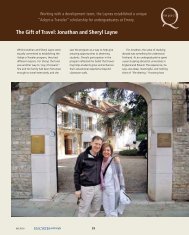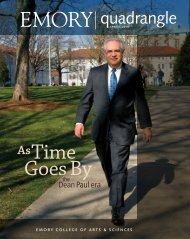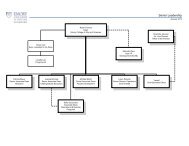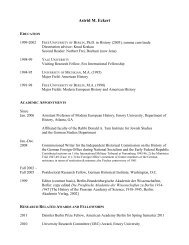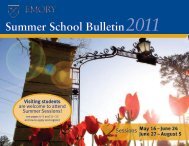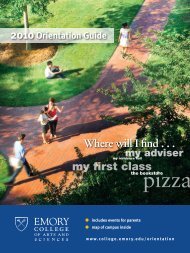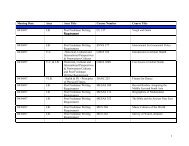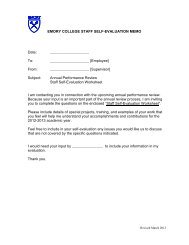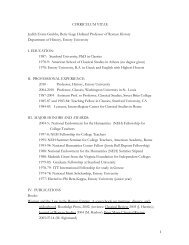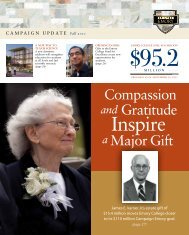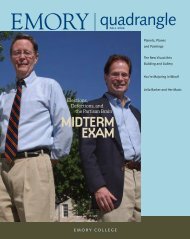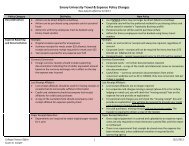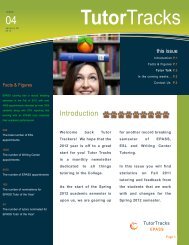2012 Summer School Bulletin - Emory College - Emory University
2012 Summer School Bulletin - Emory College - Emory University
2012 Summer School Bulletin - Emory College - Emory University
Create successful ePaper yourself
Turn your PDF publications into a flip-book with our unique Google optimized e-Paper software.
Biology<br />
120-00C. CONCEPTS IN BIOLOGY WITH LAB<br />
10:00–11:20 a .m . Daily . Lab, 12:00–3:00 p .m . TTh . 2nd session . Credit, 4 hrs . Gilson<br />
The lecture and laboratory portions of this course will be organized around four modules<br />
that relate biology to current issues. Both the lecture and laboratory portions of the<br />
course will emphasize student-centered, collaborative, inquiry-based learning. Students in<br />
the course will help to shape its content. Satisfies GER Tag SNT [Area V. (Science, Nature,<br />
Technology)] laboratory course.<br />
141-00A. FOUNDATIONS OF MODERN BIOLOGY I WITH LAB<br />
10:00–11:20 a .m . Daily . Lab, TTh 12:00–3:00 p .m . or TTh 3:30–6:30 p .m .<br />
1st session . Credit, 4 hrs . Campbell<br />
Biology 141 will provide a topic-driven overview of molecular and cellular biology<br />
and genetics. Topics covered will address major issues in human biology and medicine.<br />
The integrated lecture and lab will emphasize the basic principles and critical thinking<br />
involved in modern biological discovery. In lab students will design and perform<br />
experiments using several important model systems. Satisfies GER Tag SNT [Area V.<br />
(Science, Nature, Technology)] laboratory course.<br />
142-00C. FOUNDATIONS OF MODERN BIOLOGY II W/LAB<br />
10:00–11:20 a .m . Daily . Lab, TTh 12:00–3:00 p .m . or TTh 3:30–6:30 p .m .<br />
2nd session . Credit, 4 hrs . Campbell<br />
Prerequisite: Biology 141. Biology 142 will introduce evolution, population biology, molecular<br />
genetics, genomics, cell signaling, and development. Topics covered will address major issues<br />
in human biology and medicine. The integrated lecture and lab will emphasize the basic<br />
principles and critical thinking involved in modern biological discovery. In lab students will<br />
design and perform experiments using several important model systems. Biology 141 and<br />
Course Number Key and Dates<br />
00A: First session May 21 – June 29 00F: Miscellaneous Varies<br />
00B: Entire summer May 21 – August 10 0PA, 0PB, 0PC Permission required<br />
00C: Second Session July 2 – August 10<br />
MAY: Maymester May 15–June 1<br />
142 meet the biology and genetics premedical requirements. Satisfies GER Tag SNT [Area V.<br />
(Science, Nature, Technology)] laboratory course.<br />
336-00C. HUMAN PHYSIOLOGY<br />
1:00–2:20 p .m . Daily . 2nd session . Credit, 4 hrs . Cafferty<br />
A study of human physiology emphasizing homeostatic mechanisms of integrated body<br />
functions. Topics include homeostasis, cell signaling, neurophysiology, endocrinology,<br />
muscle physiology, cardiology, respiration, and urology.<br />
497R-0PA, -0PB, -0PC. SUPERVISED READING<br />
TBA . Credit, 1–4 hrs . Faculty<br />
Prerequisite: Consent of instructor.<br />
499R-0PA, -0PB, -0PC. UNDERGRADUATE RESEARCH<br />
TBA . Credit, 1–4 hrs . Faculty<br />
Prerequisite: Consent of instructor.<br />
Chemistry<br />
141-00A. GENERAL CHEMISTRY I WITH LABORATORY<br />
10:00–11:20 a .m . Daily . Lab, TTh 2:00–5:00 p .m . 1st session . Credit, 4 hrs . Mulford<br />
This course is an introduction to chemistry, the central science. The fundamentals of<br />
chemistry are essential for a greater understanding of biological and physical processes.<br />
This course aims to develop a skill set that encompasses problem solving and critical<br />
thinking. The content covers the principles of stoichiometry, solution reactions, atomic<br />
structure, periodic trends, molecular structure, bonding, and states of matter. The<br />
laboratory portion aims to develop skills in hands-on experimental techniques, data<br />
analysis, and applied problem solving. Specific experiments involve qualitative and<br />
quantitative analyses, properties of gases, calorimetry, and titrations. The laboratory is<br />
a required element of Chemistry 141.<br />
<strong>Summer</strong> <strong>School</strong> <strong>Bulletin</strong> Courses | 16 www.college.emory.edu/summer



